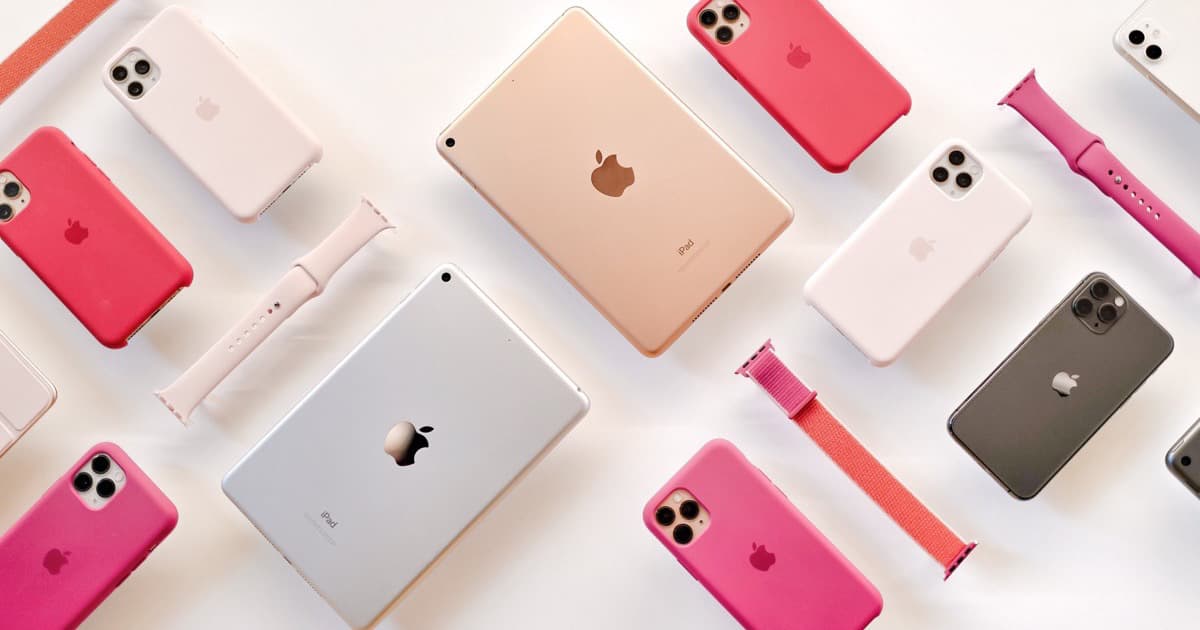Our holiday giveaway has officially come to an end, and we’re so excited to share the results! Congratulations to Antoni N.!
Don't Miss Out On Your Free Year of Apple TV+
The free trial for Apple TV+, which people who purchased a new device from September 10 2019 qualified for, is coming to an end.
117 Emoji Coming This Year, Like a Mammoth, Dodo, Worm, and More
The Unicode Consortium has approved the first group of new emojis for 2020, known as Emoji 13.0. They feature 117 of the fun symbols, including a mammoth, dodo bird, worm, and a lot more.
As with all new emoji releases, the appearance of each emoji varies by platform. Images shown on this page (and tweet thread) are original designs created by Emojipedia in a glossy style to show one potential way these may look when implemented on major platforms such as iOS, Android, WhatsApp, or Twitter.
How the Windows Team Was “Blinded” by the iPad
Former Windows chief Steven Sinofsky wrote a blog post about how his team were caught off guard by the iPad.
The success of iPhone (140K apps & 3B downloads announced that day) blinded us at Microsoft as to where Apple was heading. Endless rumors of Apple’s tablet *obviously* meant a pen computer based on Mac. Why not? The industry chased this for 20 years. That was our context.
It’s a good read. Everyone expected Apple to compete with netbooks. They did, but not by creating their own Mac netbook.
Satirical News Site ‘The Onion’ Comes to Apple Podcasts
The Onion is debuting a daily news podcasts called The Topical is coming to Apple Podcasts and other platforms. No word on whether it will be real news or a comedy podcast.
Leading media experts agree our subservience to the written word has ended, and all future generations will passively absorb information from The Onion’s podcast each day. In fact, an emerging consensus suggests this could be the last sentence you ever have to read if you click below right now to listen to The Topical, thereby freeing yourself from a dying culture’s benighted era of literacy.
Apple Podcasts: The Topical
Rumor: New Apple Products Coming Like Apple Tag, Bluetooth Headphones, iPad Pro, More
Ming-Chi-Kuo’s report concerning how the Coronavirus will affect Apple also included speculations on new Apple products.
Combine Fantastical Into One Powerful Platform With New Premium Subscription
Fantastical announced a new subscription model, bringing the productivity and scheduling tool into a single platform, across all devices.
Apple Earnings Analysis – TMO Daily Observations 2020-01-29
John Martellaro and Bryan Chaffin join host Kelly Guimont to discuss Apple’s “December quarter” earnings report and conference call.
Ming-Chi-Kuo Says Coronavirus Threatens Apple
Apple supply chain analyst Ming-Chi-Kuo says that the Coronavirus is a threat to Apple’s business since much of it is based on China.
iOS 13: How to Use Screen Time as a Privacy Feature
Using Screen Time, Andrew shows you how to block robocalls, disable your microphone and camera, and make the job harder for thieves.
Analysts Bullish Following AAPL First Quarter Earnings
There was a bullish reaction to Apple’s latest results, with financial institutions upping their target price for the stock.
Apple Stops Almost All Travel to China Amid Coronavirus Outbreak
Apple is limiting staff travel to China and has closed one of its stores in the country as the coronavirus continues to spread.
Pokémon Home Cloud Service Launching February 2020
Pokémon HOME is set to launch in February 2020 and will allow users to transfer their Pokémon across game systems and linked games.
Apple Store in India May Not Happen in 2020
Apple plans to launch an online store in India in the third quarter of 2020. However, according to Techcrunch, a much anticipated physical store there might not open this year.
The source said the company was still working on the logistics of setting up the store and that the quarter between July and September was the new deadline. Apple CEO Tim Cook would likely plan an India trip for the announcement, the source said. The company’s first official physical store in India, to be situated in Mumbai, will take an additional few months of time for setting up and might not be ready by this year, the source said.
Here’s What the ‘Race to 5G’ Really Means
Karl Bode writes about corporations talking about the “race to 5G”, saying that it’s more like a race to bigger profits.
The “race” rhetoric is largely an illusion created by companies eager to do the bare minimum in exchange for as many subsidies, regulatory favors and tax breaks they can grab. This mindless regulatory capture has resulted in a US Telecom sector that routinely ranks in the middle of the pack in every metric that matters. While 5G will be a good thing when deployed at scale, it’s foolish to think the new wireless technical standard will address the deeper rot that plagues the sector.
Mr. Zuckerberg Goes to Brussels
Mark Zuckerberg is to head to Europe to try and stop EU lawmakers implementing tough new regulations on his firm, Bloomberg News reports. The Facebook CEO’s Brussels visit will coincide with his attendance at the Munich security conference.
The Belgian capital has for years been at the forefront of regulating large U.S. tech companies, with strict competition enforcement and its flagship privacy rules, the General Data Protection Regulation, which entered into force in 2018. Facebook currently faces a slew of probes by national data protection regulators. At the same time, the European Commission, the bloc’s executive body, is looking into possible antitrust issues around how the company collects user data and has criticized the social media giant’s handling of the spread of disinformation on its platform.
AAPL Reports Record Q1 Revenue of $91.8 Billion and Record Q1 EPS of $4.99 [Update]
Apple reported a record December quarter — the company’s fiscal first quarter — with revenues of $91.8 billion and earnings per share (EPS) of $4.99, both all-time records. [Updated with more details, including guidance, category sales, and Wall Street expections.]
Focus - Website and Application Blocker for MacOS Unlimited Plan: $29.99
We have a deal on Focus, a website and application blocker for the Mac that’s designed to help you stay on task. Focus sits in your menu-bar and helps you block distracting websites, domains, or apps. It also features schedules and timers, password protection, productivity stats, BASH scripting support, and more. I’m linking to our deal for an Unlimited Plan for $29.99, but there are also less expensive plans called Productivity and Professional.
File Organization, More Apple Original Content – TMO Daily Observations 2020-01-28
Dave Hamilton and Andrew Orr join host Kelly Guimont to discuss file management tips and Apple branching out into other media types.
Apple Releases iOS 13.3.1, macOS Catalina 10.15.3, et al
Apple has released the latest update to its various operating systems: iOS 13.3.1, iPadOS 13.3.1, tvOS 13.3.1, watchOS 6.1.2, and more.
MGM Held Preliminary Talks With Apple About a Possible Acquisition
Both Apple and Netflix are understood to have held preliminary talks with MGM about potentially acquiring the media firm.
How Apple's 'Powder' Shot on iPhone Video Was Made
Apple dropped a new Shot on iPhone video Monday. Titled ‘Powder’, it featured X Games snowboarders taking on fresh snow, and Cult of Mac spoke to its director, Joe Carlino.
“Lately I’ve been making content with ESPN X Games the last two years that is 100% shot on iPhone,” Carlino said. The great thing about shooting on iPhone in this context is how quick and easy it is. The small form factor devices make it easy to capture action footage that’s good enough to be used on both social media and TV broadcasts. “[Last fall], a friend of mine who works internally at Apple reached out to me about doing a full-on backcountry powder video,” he continued.
5G is Not Going to Save UK Smartphone Sales
Smartphone makers, not least Apple, have long hoped that the widespread rollout of 5G will encourage users to buy new, compatible, devices. However, Wired highlighted some recent research that indicated this might not be the case.
Research released this week by analyst firm Gartner predicts that UK smartphone sales will not just fail to surge, they will flatline with zero per cent growth expected. Despite the continuing rollout of the 5G network and additional 5G-ready phones coming on the market, the UK is literally not buying into the 5G hype. This is more bad news after a poor year for major smartphone manufacturers in 2019: in the opening quarter Apple and Samsung combined sold almost 17.5 million fewer smartphones globally compared to 2018. The reason, analysts explained at the time, was that people did not feel the urge to upgrade their devices as often as they used to, partially because smartphones are now so much more expensive.
DMCA Takedowns Remove Most of the Content From The Unofficial Apple Archive
The other day, I highlighted the wonderful Unofficial Apple Archive. It was a fantastic resource, full of Apple history. I say ‘was’ because the archive has been almost emptied by DMCA takedown notices, 9to5Mac reported.
Site creator Sam Henri Gold told us that he only wanted to save Apple’s history from being lost after the EveryAppleAds YouTube channel was taken down in April 2017… Gold said at the time that he was aware this could happen. Sam knows his efforts could be rendered useless with one word from Apple. But he hopes the amicable and educational nature of the archive will keep it online, because the Apple community deserves no less. “I think we’ve seen what a world without a public archive would look like, a world littered with tiny archive channels, maybe one or two god-awful screen recordings of keynotes with giant […] watermarks. That’s not a world I want to live in.”

















![AAPL Reports Record Q1 Revenue of .8 Billion and Record Q1 EPS of .99 [Update]](https://www.macobserver.com/wp-content/uploads/2016/06/apple-money-pile.jpg)





